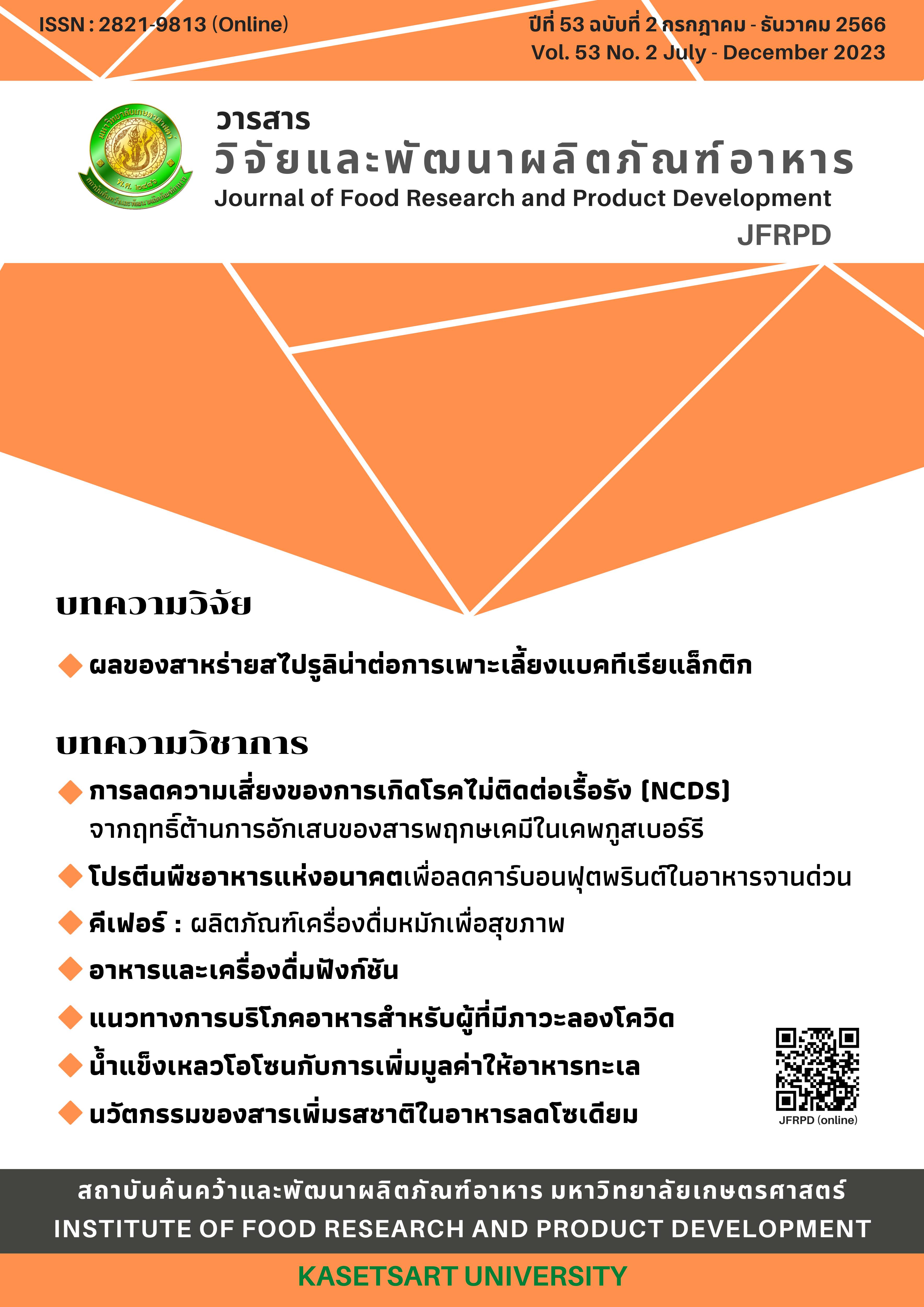โปรตีนพืชอาหารแห่งอนาคตเพื่อลดคาร์บอนฟุตพรินต์ในอาหารจานด่วน The future of plant-based protein for reducing the carbon footprint in fast food
Main Article Content
Abstract
Nowadays, plant-based protein has become a megatrend in the global food industry, serving as a substitute for meat. It is compatible with the modern lifestyle that is becoming more health-conscious.Moreover, plant-based protein contributes to balancing raw materials, especially if the world faces meat shortages due to environmental problems, such as helping reduce global warming caused by greenhouse gases. Consumers have begun to realize the importance of embracing more sustainable food consumption. In particular, there is a shift in the form of fast-food items such as hamburgers, sausages, nuggets, pizza, etc., from the meat-based protein to alternative proteins based on plants. The food industry has to start adapting to utilize more protein from plants to reduce carbon dioxide emissions. Therefore, a carbon footprint must be established to estimate greenhouse gas emissions and address future carbon taxes.
Keywords : carbon footprint, fast food, plant-based protein
บทคัดย่อ
ปัจจุบันโปรตีนพืชกลายเป็นเทรนด์ของอุตสาหกรรมอาหาร นอกจากจะนำมาใช้ในการทดแทนเนื้อสัตว์แล้ว ยังสามารถเข้ากับรูปแบบของการใช้ชีวิตของคนในยุคสมัยใหม่ที่หันมาใส่ใจสุขภาพกันมากขึ้น โปรตีนพืชช่วยเพิ่มสมดุลในการใช้วัตถุดิบจากกรณีที่โลกต้องเผชิญกับสภาวะขาดแคลนเนื้อสัตว์เนื่องจากปัญหาสภาพสิ่งแวดล้อมรวมถึงช่วยลดสภาวะโลกร้อนที่เกิดจากก๊าซเรือนกระจกจากปัจจัยต่าง ๆ ที่กล่าวมาจึงทำให้ผู้บริโภคเห็นความสำคัญและหันมาบริโภคอาหารเพื่อความยั่งยืนมากขึ้น โดยเฉพาะการเปลี่ยนรูปแบบของอาหารประเภทอาหารจานด่วน เช่น แฮมเบอร์เกอร์ ไส้กรอก นักเก็ต พิซซ่า ฯลฯ จากโปรตีนเนื้อสัตว์เดิมเปลี่ยนเป็นโปรตีนจากพืชทำให้อุตสาหกรรมอาหารเริ่มปรับตัวมาใช้โปรตีนจากพืชมากขึ้น เพื่อลดปริมาณการปล่อยก๊าซคาร์บอนไดออกไซด์ให้มีปริมาณน้อยลง ซึ่งการจัดทำคาร์บอนฟุตพรินต์จะช่วยประเมินการปล่อยก๊าซเรือนกระจกและรับมือกับภาษีคาร์บอนที่จะเกิดขึ้นในอนาคต
คำสำคัญ : คาร์บอนฟุตพรินต์ อาหารจานด่วน โปรตีนจากพืช
Downloads
Article Details
References
รชต สนิท. ไทยงามหน้า 60 ปีที่ผ่านมา ปล่อย CO2 เพิ่มขึ้นเป็นอันดับ 2 ของโลก มากกว่าเวียดนาม. Brandinside [อินเทอร์เน็ต]; 2565 [เข้าถึงเมื่อ 4 ก.ย.2566]. เข้าถึงได้จาก: https://brandinside.asia/thai-co2-emission-grow-the-second-fastest-in-the-world/
Richter CK, Skulas-Ray AC, Champagne CM, Kris-Etherton PM. Plant protein and animal proteins: do they differentially affect cardiovascular disease risk. Adv Nutr. 2015;6(6):712-28.
Gorissen S HM, Crombag J JR, Senden J MG, Waterval WA H, Bierau J, Verdijk L B, et al. Protein content and amino acid composition of commercially available plant-based protein isolates. J.Amino Acids. 2018;50(12):1685-95.
Naksit Panyoyai. Plant-based Proteins: Nutrition, Structure, Functionality, and Applications in Food Industry. Rajabhat Agric. 2020;19(1):61-9.
USFDA. Food Data Central Search Results. Agricultural Research Service; 2023 [cited 2023 September 9]. Available from: https://fdc.nal.usda.gov/fdc-app.html#/
SME Thailand. แบรนด์ดังระดับโลกพร้อมใจ ออกเมนูไร้เนื้อสัตว์ รับกระแส Plant-based food คาดมีมูลค่า 8.2 หมื่นล้านบาทในปี 2566. ศูนย์รวมข้อมูลธุรกิจเอสเอ็มอี [อินเทอร์เน็ต]; 2565 [เข้าถึงเมื่อ 5 พ.ค. 2566]. เข้าถึงได้จาก:https://www.smethailandclub.com/entrepreneur/8000.html
The Washington post. KFC and Chipotle launched new plant-based products nationwide. They probably won’t be the last; 2022 [cited 2023 September 4]. Available from: https://www.washingtonpost.com/food/2022/01/05/kfc-chiotle-plant-based-chicken-chorizo-menu/
กรมโรงงานอุตสาหกรรม. LCA เครื่องมือสู่การพัฒนาผลิตภัณฑ์สีเขียว. โครงการจัดทำคู่มือข้อมูลวัฏจักรชีวิตผลิตภัณฑ์ (LCA-LCA). นนทบุรี: มูลนิธิสิ่งแวดล้อมไทย. 2551;10-51.
Xu X, Sharma P, Shu S, Lin T S, Ciais P, Tubiello FN, et al. Global greenhouse gas emissions from animal-based foods are twice those of plant-based foods, Nature Food. 2021;2(1):724-32.
US EPA, Global Methane Initiative; 2022 [cited 2023 May 24]. Available from: https://www.epa.gov/gmi/importance-methane
Morgan R. editors. McDonald's, KFC, Hungry Jack's & Dominos's Pizza are Australia's favorite restaurants; 2021 [cited 2023 May 30]. Available from: https://www.roymorgan.com/ findings/mcdonalds-kfc-hungry-jacks-dominos pizza-are-australias-favorite-restaurants
Jazbec M, Salim H, Khara T, Cordell D, White S. Shifting the Menu: Reducing the carbon footprint of fast-food consumption by switching to plant-based options. Technical Report; 2022; the Institute for Sustainable Futures, University of Technology Sydney, for World Animal Protection;2022.
NSW DPI. Managing livestock to reduce methane emissions; 2023 [cited 2023 May 11]. Available from: https://www.dpi.nsw.gov.au/dpi/climate/Carbon-and-emissions/emissions-reduction-pathways/livestock-industries/methane_emissions
Our World in Data. Food: greenhouse gas emissions across the supply chain; 2018 [cited 2023 May 20]. Available from: https://ourworldindata.org/grapher/food-emissions-supply-chain
OECD, “Agricultural Ouput - Meat Consumption,” Organisation for Economic Co-Operation and Development;2022 [cited 2023 May 15]. Available from: https://data.oecd.org/agroutput/meat-consumption.htm
Wiedemann SG, Henry BK, Gahan EJ, Grant T, Murphy CM, Niethe G. Resource use and greenhouse gas intensity of Australian beef production: 1981-2010, Agricultural Systems. 2015;133:109-18.
เยาวดี คุปตะพันธ์. รอยเท้าคาร์บอนกับอุตสาหกรรมอาหาร. วารสารอาหาร. 2011;41(1):52-6.

